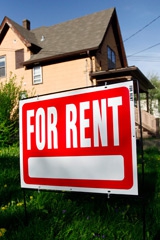Thinking of becoming a landlord? Ask yourself these questions first.
Whether you sell your home or rent it out depends on any number of factors—from financials to your own personal comfort zone. Here are a few things to consider when debating whether to sell or rent.
1. Do you need money from your home’s sale to purchase a new home?
If you do, selling your home may be the better option.
2. Is your move permanent?
If you’re leaving your home to permanently move elsewhere, it may make sense to sell. However, if you plan to return to the area in the next few years, you might save money in realtor commissions, closing costs and other fees by keeping your home, renting it out and returning to it in the future.
3. Do you plan to sell your home eventually?
If you plan to sell your home in the next two to three years and can afford to keep it, it may make sense to rent it out. The IRS lets individuals exclude up to $250,000 in home sale profit on their income taxes ($500,000 for married-filing-jointly returns), as long as you have owned the home and lived in it as your primary residence for two of the five years prior to selling.
However, if you plan to sell it after three years of not living in your home, then you’ll be on the hook to pay taxes on your home sale profits.
4. Would potential rental income cover your home’s expenses?
Add up the regular expenses you pay for your home—your mortgage, property taxes, insurance, trash collection, and any other regular expenses. Then estimate costs for regular maintenance as well as the work required each time a tenant moves out (painting, carpet cleaning and other repairs).
Next, do some research to find out what homes similar to yours are renting for in your neighborhood. This will give you a sense of what you might earn each month in rental income. If your rental income pays for or exceeds your expenses, it might make sense to rent your home.
5. Are you comfortable being a landlord?
As a landlord, you’ll need to know and follow your state’s rules and laws on tenant rights. You’ll need to take time to find and screen tenants, respond to their complaints, tend to repairs, maintain the property, collect rent and possibly evict tenants who don’t pay.
Being a landlord requires work, patience, good communication skills and knowledge of all applicable laws. Be sure to assess your comfort level with all the requirements of being a good landlord before you decide to rent your home.
This article contains general information. Individual financial situations are unique; please, consult your financial advisor or tax attorney before utilizing any of the information contained in this article.
Related Articles
- How to deal with noise complaints in your HOA
- 5 Tips To Prevent Noise Complaints In Your HOA
- Start Enforcing Your HOA's Rules
- How To Change Your HOA's Rules
- When You May Consider A Quitclaim Deed
- Generate income while waiting to claim Social Security
- Should you use a home equity loan?
- How to pay for long-term care
- Create an annual calendar for your HOA
- Follow procedures for collecting HOA fees
- 10 tips to reduce HOA legal fees
- HOA: Five Best Practices
- Own a home in a community association? Use this tax break!
 Print
Print Email
Email








